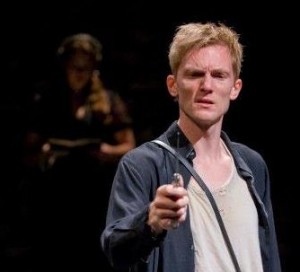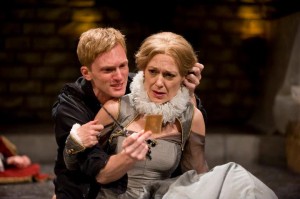THE DANE’S THE THING
The oft-produced Hamlet demands countless choices by a director and Michael Halberstam has met all the challenges; instead of overloading the evening with grandiose directorial concepts, he resolves the script’s knotty problems with intelligent interpretation and theatrical savvy. Like nearly all revivals of Hamlet, the director takes some liberties with the text: at Writers’ Theatre, the play opens at the court in Elsinore and not on the castle ramparts. Halberstam drops that opening scene and gets right into the complex domestic narrative. Lines are excised and some words are changed, but all in the service of speedy pace and intelligible Elizabethan language. But his greatest achievement is casting Scott Parkinson as the melancholy Dane.
There are innumerable ways to play the character of Hamlet. Parkinson, with his slight build and Nordic look, is an intense, excitable prince. His mad scenes are realistic enough to make us wonder if the prince really has lost his mind, and yet when he proclaims, “I know a hawk from a handsaw” we recognize that beneath all the showy frenzy there is a sharp, steely intellect at work. But overall Parkinson’s Hamlet lives with his nerves exposed. The death of his father has shaken the prince to his core, and his mother Gertrude’s marriage to his uncle tears him apart psychologically. You can read Freudian overtones into Hamlet’s passion for Gertrude, but Parkinson doesn’t overdo it. His love for his dead father matches his love for his living mother and the emotional load is unbearable for him.
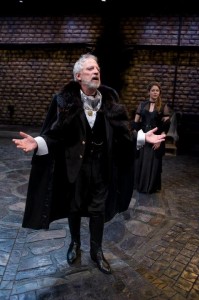 Parkinson’s performance soaks up almost all the production’s oxygen. The variable supporting performances exist to feed the star character. Larry Yando, as usual, distinguishes himself in a variety of small roles: he is at once bitter, angry, despairing, and demanding as the ghost, but playfully reinvents himself as the First Player, with his Hecuba speech, and then again as the Player King, and finally as a richly comic Gravedigger.
Parkinson’s performance soaks up almost all the production’s oxygen. The variable supporting performances exist to feed the star character. Larry Yando, as usual, distinguishes himself in a variety of small roles: he is at once bitter, angry, despairing, and demanding as the ghost, but playfully reinvents himself as the First Player, with his Hecuba speech, and then again as the Player King, and finally as a richly comic Gravedigger.
Liesel Matthews never seems quite comfortable in the role of Ophelia, and the sexual frisson with Hamlet is lacking power. Michael Caravan is a dignified and royal Claudius but the character never comes across as a tortured villain; his relationship with Gertrude seems bland, when it should be giving off waves of sensuality. Shannon Cochran is excellent in her scenes with Hamlet but her Gertrude needs a more heightened erotic dimension with Claudius. Curiously, those fine actors Timothy Edward Kane and Kareen Bandealy don’t make much of an impression as Laertes and Horatio respectively, and couple of the actors in small parts surprisingly aren’t yet ready for prime time Shakespeare.
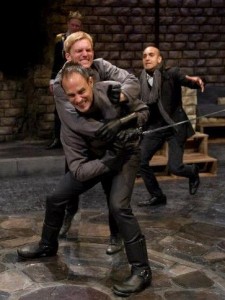 On the plus side, Ross Lehman is outstanding as Polonius, something of a silly ass but still nobody’s fool. He delivers Polonius’s charge to his departing son Laertes with parental concern and much good sense. Billy Fenderson gives Guildenstern some unexpected stage presence as a kind of medieval Danish frat boy. And in a nice in-joke touch, Rosencrantz and Guildenstern make their first entrance with a visual quote from Tom Stoppard’s Rosencrantz and Guildenstern Are Dead.
On the plus side, Ross Lehman is outstanding as Polonius, something of a silly ass but still nobody’s fool. He delivers Polonius’s charge to his departing son Laertes with parental concern and much good sense. Billy Fenderson gives Guildenstern some unexpected stage presence as a kind of medieval Danish frat boy. And in a nice in-joke touch, Rosencrantz and Guildenstern make their first entrance with a visual quote from Tom Stoppard’s Rosencrantz and Guildenstern Are Dead.
A few of the deletions do undercut the action. I missed the comedy and the expense of that ninny courtier Osric. The final duel scene that results in a stage littered with stabbed and poisoned corpses is a bit too condensed, but these are minor complaints in the big picture that displays Hamlet as a great piece of storytelling.
The production gains much from the intimacy of the Tudor Court stage, where the audience views the action at point blank range. Collette Pollard has designed an all-purpose setting dominated by a brick wall at the rear of the stage and a brick and masonry floor that combine to evoke the Elsinore castle, inside and out. David Hyman’s costume designs range from the historical to the contemporary without ever looking out of place or anachronistic. Sarah Hughey’s lighting design and Mikhail Fiksel’s sound design both make appropriate atmospheric contributions.
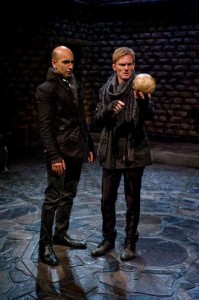 But ultimately it all comes down to Parkinson. The ultimate test of an actor playing the famous Dane resides in the famous soliloquys. Parkinson and Halberstam obviously have given the speeches much thought and the happy result is a freshness that gives new insight to even the excessively familiar “To be or not to be.” Parkinson addresses the audience directly in most of the soliloquys, not as recitations but as sentiments that probe the young man’s soul. They cap a performance that is both thoughtful and exciting and essential viewing.
But ultimately it all comes down to Parkinson. The ultimate test of an actor playing the famous Dane resides in the famous soliloquys. Parkinson and Halberstam obviously have given the speeches much thought and the happy result is a freshness that gives new insight to even the excessively familiar “To be or not to be.” Parkinson addresses the audience directly in most of the soliloquys, not as recitations but as sentiments that probe the young man’s soul. They cap a performance that is both thoughtful and exciting and essential viewing.
===================
photos by Michael Brosilow
Hamlet
Writers’ Theatre in Glencoe
ends on November 11, 2012 EXTENDED to November 25, 2012
for tickets, call 847.242.8000 or visit Writers
for more shows, visit Theatre in Chicago

